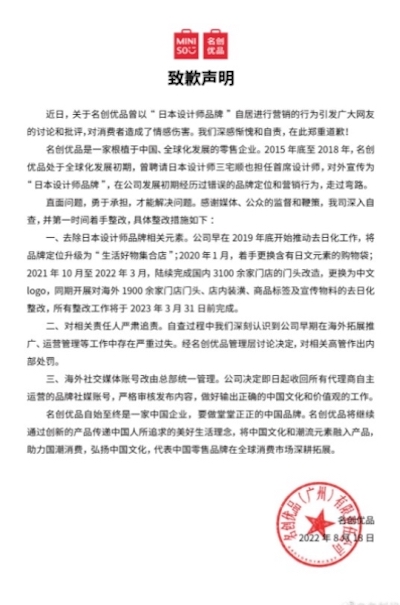Chinese retailer Miniso apologizes for marketing itself as a Japanese brand
Chinese lifestyle retailer Miniso has apologized for promoting itself as a "Japanese designer brand."
In a statement released on Weibo on Aug. 18, Miniso said that it is regretful and guilty of taking the "wrong direction" and positioning itself as a brand that originated in Japan, from 2015 to 2018.
"We apologize for hurting customers' feelings by positioning ourselves as a Japanese designer brand in an early stage of development," Miniso wrote.
According to the global Guangzhou-based variety store, this marketing strategy came into fruition after it appointed Japanese designer Miyake Junya as its chief designer.

Apart from serving the brand as head of design, Miyake is part of Miniso as its co-founder. In an interview with Entrepreneur in August 2019, the acclaimed fashion designer revealed that he met Miniso's founder and CEO Ye Goufu in 2013 through a common friend and "hit it off immediately." Miniso's first branch was opened in China in the same year.
In the Chinese firm's statement last week, it said that it has begun "de-japanizing" its signboards and interior decoration in 2019, and in the following year, Japanese elements were removed from its shopping bags.
In addition, Miniso completed redesigning its 3,100 branches in China and has changed its logo from October 2021 to March 2022. The changes are expected to be completed across its 4,200 stores around the globe by March 2023.
The brand's management, meanwhile, pledged to take proper action against the senior executives involved in the "severe mistake." This is in addition to its goal to "export the correct Chinese culture and values" moving forward.
Miniso's statement comes after its Spanish unit posted a photo of one of its dolls last July, which was wearing the Chinese traditional costume cheongsam, but was identified as a "Japanese Geisha doll." The post consequently angered many Chinese netizens and shoppers.


